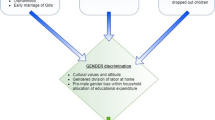Conclusion
In the last two decades of the twentieth century, many Africans have experienced decline or stagnation in the quality of their lives. The continued high rates of poverty and declining educational enrolments in the region are outcomes of multiple factors, including escalating debt and declining development assistance on the global level and fiscal mismanagement, weak governance and continued population growth within African countries. One realization that has come from the experiences of recent decades is that poverty is both a cause and an outcome of low educational enrolments. Breaking the cycle requires great effort on two fronts simultaneously: (a) a targeted attack on poverty through policies that promote sustainable and equitable development; and (b) an unwavering long-term investment in basic education (Psacharopoulos, 1995). The question remains whether international organizations, African governments and local communities will heed the lessons learned from past missteps and apply them to future educational initiatives. Both the international community's renewed awareness of the importance of basic education and the recent educational efforts of African-based NGOs suggest that the answer to this question is a tentative ‘yes’. Perhaps the first decade of the new millennium will bring a more definitive answer.
Similar content being viewed by others
References
Buchmann, C. 1996. The debt crisis, structural adjustment and women's education: implications for status and social development.International journal of comparative sociology (Leiden, Netherlands), vol. 37, p. 5–30.
— 1999.Family decisions, school enrollment and shadow schooling in East Africa. Durham, NC, Duke University. Mimeo.
Cornia, G.A.; Jolly, R.; Stewart, F. 1987.Adjustment with a human face. 2 vols. Oxford, UK, Oxford University Press.
Hinchliffe, K. 1989. Economic austerity, structural adjustment and education: the case of Nigeria.IDS bulletin (Brighton, UK), vol. 20, no. 1, p. 17–23.
Noss, A. 1991.Education and adjustment. a review of the literature. Washington, DC, World Bank.
Psacharopoulos, G. 1994. Returns to investment in education: a global update.World development (New York), vol. 22, no. 9, p. 1325–43.
— 1995.Building human capital for better lives. Washington, DC, World Bank.
Psacharopoulos, G.; Steier, F. 1987.Foreign debt and domestic spending: an international comparison. Washington, DC, World Bank. (Education and Training Series, Discussion Paper 91.)
Reimers, F.; Tiburcio, L. 1993.Education, adjustment and reconstruction: options for change. Paris, UNESCO.
Tanzania Development Research Group (TADREG). 1993. Parents' attitudes towards education in rural Tanzania. Dar es Salaam, TADREG. (Research report, no. 5.)
Tilak, J. 1990. External debt and public investment in education in sub-Saharan Africa.Journal of education finance (Gainesville, FL), vol. 15, p. 470–86.
United Nations. 1996.Africa recovery (New York), vol. 10, 27 p.
—. 1998.African economic report, 1998. New York, United Nations.
United Nations Children's Fund. 1996.The cost and financing of primary education: options for reform in sub-Saharan Africa. New York, UNICEF.
—. 1997.The state of the world's children, 1997. Oxford, UK, Oxford University Press.
—. 1999.The state of the world's children, 1999. Oxford, UK, Oxford University Press.
United Nations Educational, Scientific and Cultural Organization. 1995.World education report, 1995. Paris, UNESCO.
—. 1998.Development of education in Africa: a statistical review. Paris, UNESCO, Division of Statistics.
World Bank. 1995.Kenya poverty assessment, Report no. 13152-KE. Washington, DC, World Bank. Population and Human Resources Division, Eastern Africa Department, Africa Region.
—. 1996a.Taking action for poverty reduction in sub-Saharan Africa: report of an African Region Task Force, Report No. 15575-AFR, May 1996. Washinton, DC, World Bank.
—. 1996b.Madagascar poverty assessment. Report No. 14044-MAG, June 1996. Washington, DC, World Bank.
—. 1998.World development report, 1998. Washington, DC, World Bank.
Additional information
Original language: English
Claudia Buchmann (United States of America) Assistant Professor in the Department of Sociology at Duke University. Her research interests include educational inequality in the international context with a special focus on educational problems and prospects in Africa. Her recent publications include ‘The debt crisis, structural adjustment and women's education: implications for status and social development’ (1996,International journal of comparative sociology) and ‘The State and schooling in Kenya: historical developments and current challenges’ (1999,Africa today).
About this article
Cite this article
Buchmann, C. Poverty and educational inequality in sub-Saharan Africa. Prospects 29, 503–515 (1999). https://doi.org/10.1007/BF02736901
Issue Date:
DOI: https://doi.org/10.1007/BF02736901




